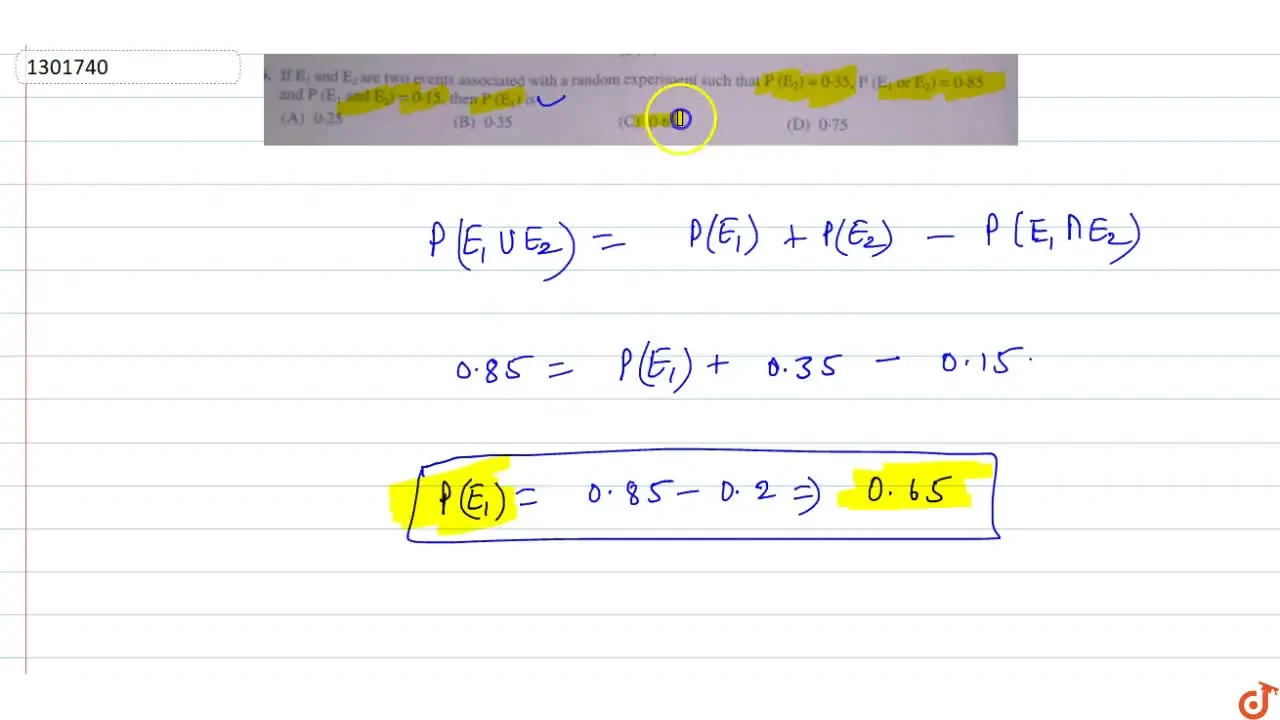If E1andE2 are two events associated with a random experiment such that P(E2)=0.35,P(E1orE22)=0.85andP(E1andE2)=0.15, then P(E1) is (A) .25 (B) .35 (C) .65 (D) .75
Let P(E1)=x. Then,
P(E1orE2)=P(E1)+P(E2)−P(E1andE2)
⇒0.85=x+0.35−0.15
⇒x=(0.85−0.35+0.15)=0.65
Hence, P(E1)=0.65.
Related Playlists
- BOOK - RS AGGARWALCHAPTER - PROBABILITYEXERCISE - Exercise 31 A25videos
PROBABILITY
- BOOK - RS AGGARWALCHAPTER - PROBABILITYEXERCISE - Exercise 31 B21videos
PROBABILITY
- BOOK - RS AGGARWALCHAPTER - PROBABILITYEXERCISE - Exercise 31 B21videos
PROBABILITY
- BOOK - RS AGGARWALCHAPTER - PRINCIPLE OF MATHEMATICAL INDUCTIONEXERCISE - EXERCISE 423videos
PRINCIPLE OF MATHEMATICAL INDUCTION
- BOOK - RS AGGARWALCHAPTER - RelationsEXERCISE - EXERCISE 2E12videos
Relations
Similar Questions
If E and F are two events associated with a random experiment for which P(E)=0.6, P(E∪F)=0.85 and P(E∩F)=0.42 , then P(F) is
View SolutionIf P(E)=0.35,P(E∪F)=0.85andP(E∩F)=0.15, then find P(E).
View SolutionSuppose E1 and E2 are two events of a random experiment such that P(E1)=14,P(E2E1)=12 and P(E1E2)=14 then P(E2)=
View SolutionLet E1 and E2 are the two independent events such that P(E1)=0.35 and P(E1∪E2)=0.60, find P(E2).
View SolutionGiven that E and F are events such that
P(E)=0.6,P(F)=0.3,P(E∩F)=0.2.
Find P(E/F) and P(F/E).View SolutionSuppose E1 and E2 are two events of a sample space such that P(E1)=12,P(E2∣E1)=12,P(E1∣E2)=14 then P(E'2)= _____
View SolutionIf E1 and E2 be two events such that P(E1)=0.3,P(E2)=0.2 and P(E1∩E2)=0.1, then find:
(i) P(¯¯¯E1∩E2) (ii) P(E1∩¯¯¯E2)View SolutionGiven that E and F are events such that P(E)=0.6,P(F)=0.3 and P(E∩F)=0.2, find P(E/F) and P(F/E).
View SolutionIf P(E)=0−8,P(F)=0.5 and P(FE)=0.4, then P(EF)=
View SolutionGiven that E and F are events such that
P(E)=0.6,P(F)=0.3 and P(E∩F)=0.2.
then (i) P(E/F)=23 (ii) P(F/E)=23.View Solution


